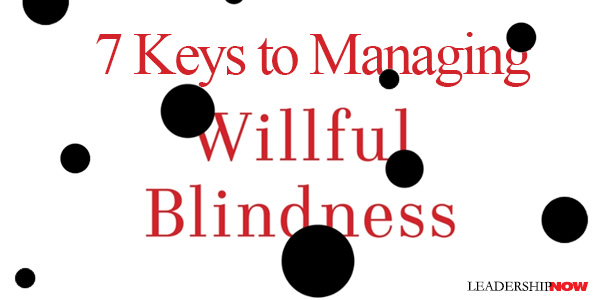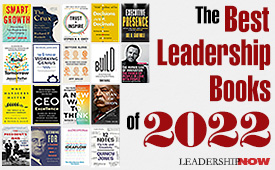 |
 |
12.13.11

7 Keys to Managing Willful Blindness
WE can’t escape willful blindness. “It’s a human phenomenon,” admits Margaret Heffernan, “to which we all succumb in matters little and large.” She explains in Willful Blindness, that it doesn’t always bring us to a disastrous end, it also oils the wheels of social intercourse and it is not inevitable but it is persistent. Sometimes we do have the courage to see. “When we confront facts and fears, we achieve real power and unleash our capacity for change.” Our brain likes the familiar. It doesn’t operate in neutral. There’s always a bias. “Our blindness grows out of the small, daily decisions that we make, which embed us more snugly inside our affirming thoughts and values. And what’s most frightening about this process is that as we see less and less, we feel more comfort and greater certainty.” An aspect of willful blindness, self-deception, is the topic of Robert Trivers’ The Folly of Fools. He asks, “Why do we possess marvelous sense organs to detect information only to distort it after arrival?” Although we gather an “exquisitely detailed perception of the outside world, as soon as that information hits our brains, it often becomes biased and distorted, usually without conscious effort.” It’s a fascinating work, but even Trivers can’t help himself from selective recall and arguments molded to fit his own biases here and there. We are all right in our own eyes. It’s difficult to share examples of blindness without exposing our own blindness. Heffernan notes, “when we work hard to defend our core beliefs, we risk becoming blind to the evidence that could tell us we’re wrong.” What can we do to escape our own self-deceptions and willful blindness? Maybe the best we can do is to balance our biases. Heffernan suggests several ways we can manage our blindness: Reexamine Your Life. When we are younger we do it more frequently. But at some point, we stop doing it. “Is it that it gets too draining to keep questioning your life?” Travel between Perspectives. Hannah Arendt calls it “thinking without a banister.” Traveling between points of view can be risky, says Heffernan. “But in the intersection between disciplines, real insight can be gleaned.” Recognize the Homogeneity of Our Lives. Put more effort into reaching out to those that don’t fit in. “Diversity, in this context, isn’t a form of political correctness but an insurance against the internally generated blindness that leaves [our Congress, corporate boards, think tanks and churches] exposed and out of touch.” Know the Limits of Our Cognitive Capacity. Go home. Working long hours taxes our cognitive capacity. Exercise. “The only exercise that seems to nurture, or at least protect, our brains is aerobic exercise.” Seek Disconfirmation. Hire dissent. This is most critical and often the most strongly opposed. “The ability to endure or even welcome debate and conflict requires practice and protection….You need to create a state in which [employees] have the courage to do something. You want to build organizations where everyone sees provocation as one of their essential roles.” Too many leaders are saying, “Why are they questioning me?” or “That’s none of their business.” Get a thinking partner for that third opinion. (See Bill George’s True North Groups.) Professional “third opinion” Saj-Nicole Joni, told Heffernan: Having a small network of people, who will bring you the unvarnished truth and with whom you can have unfettered exploration, are a partial antidote to willful blindness.Heffernan adds: “Outsiders—whether you call them Cassandras, devil’s advocates, dissidents, mentors, troublemakers, fools, or coaches—are essential to any leader’s ability to see.” Challenge Complexity. Provoke skepticism around complexity. “Many organizations view their impenetrability as a feat of fantastic intellectual virtuosity. In reality, it’s a huge cause of blindness and explains why, when such companies get into trouble, they can’t find their way out of it.” Endure the Noise. Silence—fear of debate, fear of debate—becomes self-perpetuating. “Without conflict, everyone remains afraid and blind…We need to celebrate those that make the noise, heroes more inspiring than talent contest winners and drunken movie stars.” Heffernan concludes that seeing starts with simple questions: “What could I know, should I know, that I don’t know? What am I missing here?”

Posted by Michael McKinney at 12:45 PM
|
BUILD YOUR KNOWLEDGE


How to Do Your Start-Up Right STRAIGHT TALK FOR START-UPS 
Grow Your Leadership Skills NEW AND UPCOMING LEADERSHIP BOOKS 
Leadership Minute BITE-SIZE CONCEPTS YOU CAN CHEW ON 
Classic Leadership Books BOOKS TO READ BEFORE YOU LEAD |